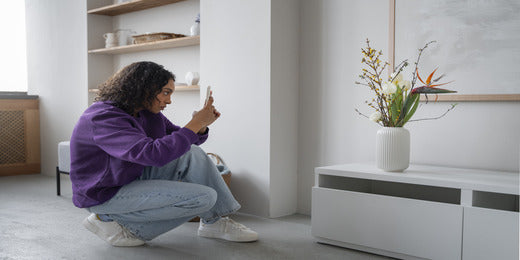Mastering Home Comfort: Top Tips on How to Reduce Humidity in Your House with AC
In the realm of home comfort, there's a silent yet significant factor that often goes unnoticed but has a profound impact on our well-being: indoor humidity. The humidity levels within your home can greatly influence your overall comfort, health, and even the longevity of your property. High humidity can make a summer's day feel even more sweltering, while low humidity in the winter can lead to dry skin and irritated respiratory systems.
Fortunately, in the battle against unwanted humidity, there's a trusty ally that many of us have right at our fingertips: the air conditioner (AC). While we typically associate AC units with cooling our living spaces, they also play a crucial role in reducing indoor humidity. If used correctly, your AC can be an effective tool for maintaining the perfect balance of moisture in your home.
In this article, we'll delve into the world of indoor humidity and explore how your air conditioner can be harnessed to combat excess moisture. We'll explain the science behind AC dehumidification, guide you through the steps of selecting the right unit, and provide practical tips for operating it to achieve optimal humidity control. Additionally, we'll offer supplementary strategies, maintenance advice, and troubleshooting tips to ensure you're equipped to conquer humidity-related challenges in your home. By the end of this article, you'll be well on your way to mastering your home's comfort and humidity levels with your trusty AC.

Understanding Indoor Humidity
Indoor humidity, simply put, is the amount of moisture or water vapor present in the air inside your home. It's a critical factor that significantly influences the comfort and well-being of your indoor living environment. Humidity levels are typically measured as a percentage, and they can vary greatly depending on various factors such as weather, climate, and the activities taking place within your home.

Why Indoor Humidity Matters for Your Comfort
Indoor humidity matters for several important reasons, all of which impact your overall comfort and health:
- Temperature Perception: Humidity levels can influence how hot or cold you feel. Higher humidity can make the air feel warmer, causing discomfort during hot summer months. Conversely, lower humidity can make the air feel cooler, which may lead to discomfort in the winter when heating systems are in use.
- Respiratory Health: Extremely low humidity levels can dry out the respiratory system, leading to issues like dry throat, irritated sinuses, and increased susceptibility to respiratory infections. Conversely, high humidity can promote the growth of allergens like dust mites and mold, exacerbating allergies and respiratory conditions.
- Home Preservation: Humidity can affect your home's structure and belongings. Excessive moisture can lead to structural damage, such as wood rot, while excessively dry conditions can cause wood to warp or crack. It can also impact electronics, artwork, and musical instruments.
Ideal Indoor Humidity Levels for Different Seasons
The ideal indoor humidity levels can vary depending on the season:
- Summer (Cooling Season): During hot and humid summer months, it's generally recommended to maintain indoor humidity levels between 30% and 50%. This range helps prevent discomfort from high humidity and reduces the likelihood of mold growth and condensation on surfaces.
- Winter (Heating Season): In colder months, when heating systems tend to dry out the air, it's advisable to keep indoor humidity levels between 30% and 40%. This prevents the air from becoming excessively dry, which can lead to issues like dry skin, irritated respiratory passages, and static electricity.
Problems Associated with High Humidity in the Home
While indoor humidity levels should be maintained within a comfortable range, allowing humidity to become excessively high can lead to various problems:
- Mold and Mildew: High humidity creates an ideal breeding ground for mold and mildew. These fungi can grow on walls, ceilings, and even inside ventilation systems, leading to health issues and structural damage.
- Dust Mites: High humidity encourages the proliferation of dust mites, which are a common allergen trigger. Allergic reactions can worsen with increased dust mite populations.
- Discomfort: In a humid environment, you may feel sticky, sweaty, and generally uncomfortable. High humidity can also disrupt sleep quality.
- Odors: Damp conditions can lead to musty odors in your home, which can be unpleasant and difficult to eliminate.
In summary, understanding indoor humidity is crucial for maintaining a comfortable and healthy living space. Ideal air humidity levels vary by season, and maintaining them is essential to prevent discomfort and problems associated with both excessively high and low humidity levels. Proper use of your air conditioner can help you achieve the desired indoor humidity for different times of the year.

Choosing the Right AC Unit
Selecting the right air conditioner (AC) unit for your home is a pivotal decision that goes beyond merely cooling your space. It directly impacts your ability to control indoor humidity and maintain overall comfort. In this section, we'll explore the critical factors to consider when choosing the right AC unit.
1. How Capacity Affects Dehumidifying Capabilities
One of the key factors influencing an AC unit's ability to dehumidify your home is its capacity, often measured in BTUs (British Thermal Units) per hour. The capacity determines how much heat an AC can remove from the air in a given time. Importantly, it also affects its dehumidifying capabilities. Here's how it works:
- Oversized AC: If you install an AC unit that's too large for your space, it will cool the air quickly but may not run long enough to dehumidify effectively. Short cycles prevent the system from removing sufficient moisture from the air, leading to an uncomfortable, clammy environment.
- Undersized AC: Conversely, an AC unit that's too small for your space will run constantly, struggling to keep up with the cooling demand. While it may remove some moisture, it won't effectively control humidity, and your space may still feel sticky.
2. Importance of Selecting the Right Size and Type of AC Unit
To ensure effective air humidity control, it's crucial to choose the right size and type of AC unit for your specific needs:
- Size: Determine the cooling capacity needed for your space based on its size and the climate in your region. An HVAC professional can perform a load calculation to help you select the appropriate size.
- Type: There are various types of AC units, including central air conditioning, ductless mini-splits, and window units. Consider factors such as your home's layout, budget, and existing infrastructure when selecting the type of AC unit.
3. Energy-Efficient Options and Their Benefits
In your quest to find the perfect AC unit, don't overlook energy efficiency. Opting for an energy-efficient AC unit can yield several benefits:
- Lower Energy Bills: Energy-efficient units consume less electricity, leading to reduced energy bills over the long term.
- Environmental Impact: Energy-efficient AC units are kinder to the environment, as they produce fewer greenhouse gas emissions.
- Improved Comfort: These units often come equipped with advanced features like variable-speed compressors and programmable thermostats, allowing for precise temperature and air humidity control.
- Rebates and Incentives: Many governments and utilities offer rebates and incentives for purchasing energy-efficient appliances, making them cost-effective.
When shopping for an AC unit, look for the ENERGY STAR label, which indicates that the unit meets or exceeds energy efficiency standards set by the U.S. Environmental Protection Agency (EPA).

Operating Your AC for Humidity Control
Once you've chosen the right air conditioner (AC) unit for your home, understanding how to operate it for optimal air humidity control is the next crucial step. In this section, we'll provide practical tips to help you maintain the perfect balance of moisture in your indoor environment.
1. Setting Your AC for Optimal Humidity Control
To effectively control indoor humidity with your AC, follow these guidelines:
- Select the Right Temperature: Set your thermostat to a comfortable temperature, typically within the recommended range for the season (e.g., 78°F in summer). Cooler temperatures won't significantly reduce humidity but will increase energy consumption.
- Use the "Cool" Mode: Ensure your AC is in cooling mode, as this is when it actively dehumidifies the air.
- Maintain a Steady Temperature: Avoid frequent adjustments to your thermostat, as this can lead to inefficient operation. Instead, choose a comfortable temperature and let your AC maintain it.
- Install and Replace Filters: Regularly clean or replace air filters, as dirty filters can impede airflow and hinder dehumidification.
2. Understanding "Fan" vs. "Auto" Settings
Your thermostat typically offers two fan settings: "Fan" and "Auto." Here's how they affect air humidity control:
- "Fan" Setting: When set to "Fan," the blower runs continuously, circulating air even when the AC is not actively cooling. While this can help distribute air more evenly, it doesn't necessarily improve humidity control when the AC is not running.
- "Auto" Setting: In "Auto" mode, the blower only runs when the AC is actively cooling or heating. This setting can be more effective for humidity control because the AC operates as needed to maintain the desired temperature and humidity level.
For optimal humidity control, it's often recommended to use the "Auto" setting, as it prevents the blower from running unnecessarily, reducing the risk of overcooling and inefficient dehumidification.
3. Use of a Programmable Thermostat for Better Humidity Management
A programmable thermostat can be a valuable tool for achieving precise humidity control. Here's how it can help:
- Customized Scheduling: Programmable thermostats allow you to set different temperature and humidity levels for various times of the day and week. This can help you maintain higher humidity levels during sleep or lower humidity while you're away from home.
- Humidity Control Settings: Some advanced programmable thermostats offer humidity control features that allow you to specify the desired humidity level. The thermostat will then adjust the AC's operation to maintain that level.
- Remote Access: Many modern programmable thermostats can be controlled remotely through smartphone apps, enabling you to make adjustments even when you're not at home.
Incorporating a programmable thermostat into your AC system can enhance your ability to manage indoor humidity effectively and efficiently.

Maintenance Tips for Efficient AC Operation and Humidity Control
Proper maintenance of your air conditioning (AC) system is essential to ensure it operates efficiently, maintains optimal humidity levels, and prolongs its lifespan. In this section, we'll provide maintenance guidelines that will help you achieve these goals.
1. Regular Filter Cleaning or Replacement
One of the simplest yet most critical maintenance tasks for your AC is cleaning or replacing the air filters. Here's why it matters:
- Airflow: Dirty or clogged filters restrict airflow, reducing the efficiency of your AC system. This can lead to insufficient dehumidification and lower cooling capacity.
- Indoor Air Quality: Clean filters help improve indoor air quality by trapping dust, allergens, and contaminants. This is particularly important for those with allergies or respiratory conditions.
- Energy Efficiency: A clean filter allows your AC to work more efficiently, which can result in lower energy bills.
- Humidity Control: Proper airflow is essential for effective humidity control. Dirty filters can hinder your AC's ability to remove moisture from the air.
To maintain optimal humidity control, check your filters regularly (at least once a month during heavy use) and clean or replace them as needed.
2. Benefits of Professional AC Servicing
While some AC maintenance tasks can be performed by homeowners, there are compelling reasons to enlist the services of a professional HVAC technician:
- Comprehensive Inspection: HVAC professionals can conduct a thorough inspection of your entire AC system, identifying issues that may go unnoticed by homeowners.
- Refrigerant Levels: Technicians can check and adjust refrigerant levels, ensuring your AC can effectively dehumidify the air.
- Cleaning and Lubrication: Professionals can clean key components, such as the evaporator and condenser coils, and lubricate moving parts. This helps maintain optimal performance and humidity control.
- Duct Inspection: Technicians can inspect your ductwork for leaks or blockages that can affect airflow and humidity control.
- Preventative Maintenance: Regular professional servicing can prevent major breakdowns and extend the lifespan of your AC system.
- Efficiency Optimization: HVAC professionals can fine-tune your AC for maximum energy efficiency, which is crucial for effective humidity control.
Consider scheduling annual or biannual professional servicing to keep your AC system in top condition and ensure it can effectively manage indoor humidity levels.

Conclusion
In the pursuit of mastering home comfort, understanding and controlling indoor humidity is a vital piece of the puzzle. Your air conditioner, often seen as a tool for cooling, can also be your ally in the battle against excess moisture. With the right knowledge and strategies, you can harness its capabilities to create a comfortable, healthy living environment.
From comprehending the significance of indoor humidity and the ideal levels for different seasons to choosing the right AC unit, setting it optimally, and performing regular maintenance, this guide has equipped you with the knowledge to transform your home into an oasis of comfort. By taking these steps, you not only enhance your well-being but also ensure that your home remains a sanctuary of relaxation, no matter the weather outside. So, take charge of your indoor climate and experience the ultimate in home comfort, all with the help of your trusty air conditioner.




































.png?height=200&name=image_2023-11-20_10-40-17%20(1).png)
.jpg?height=200&name=855%20(1).jpg)

